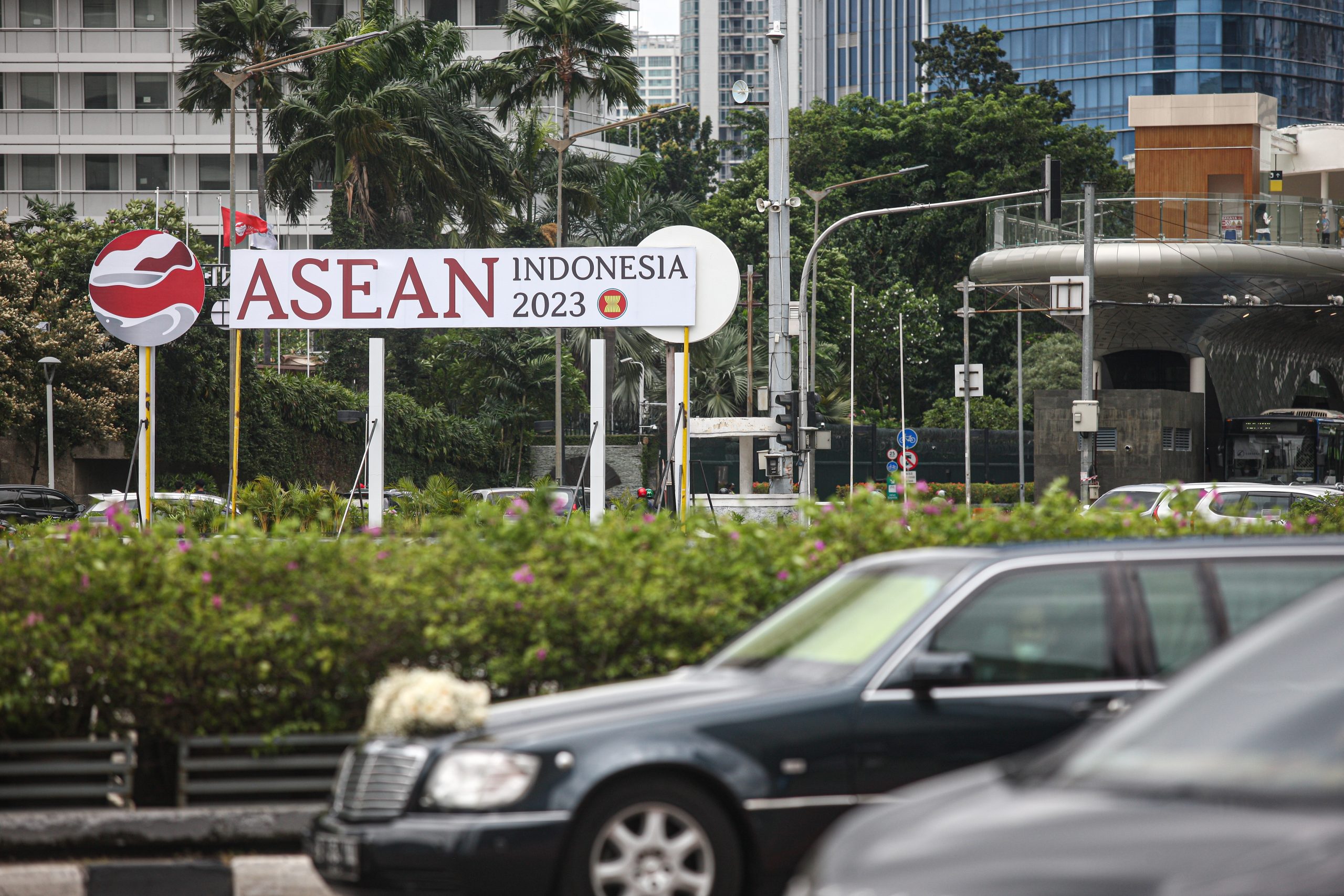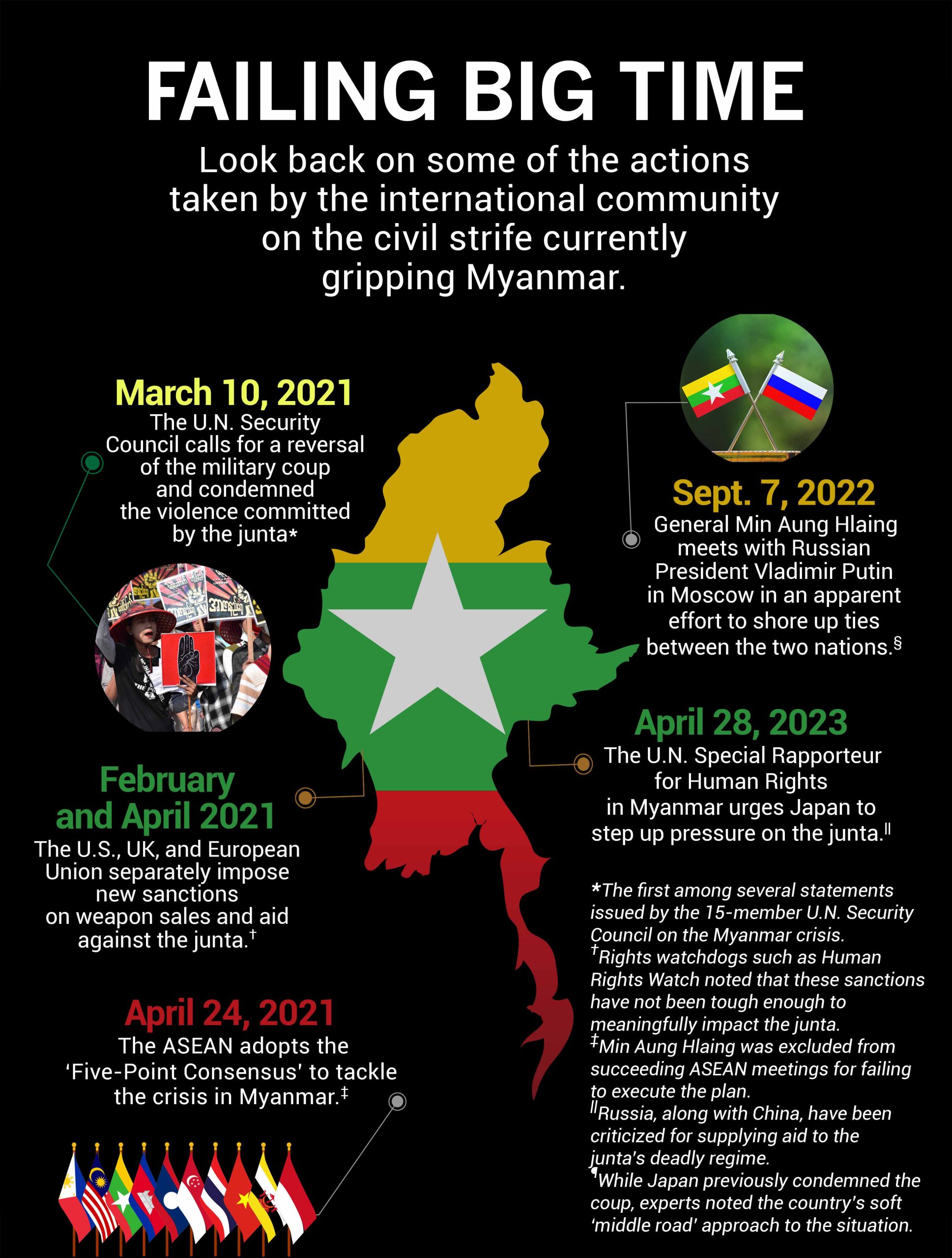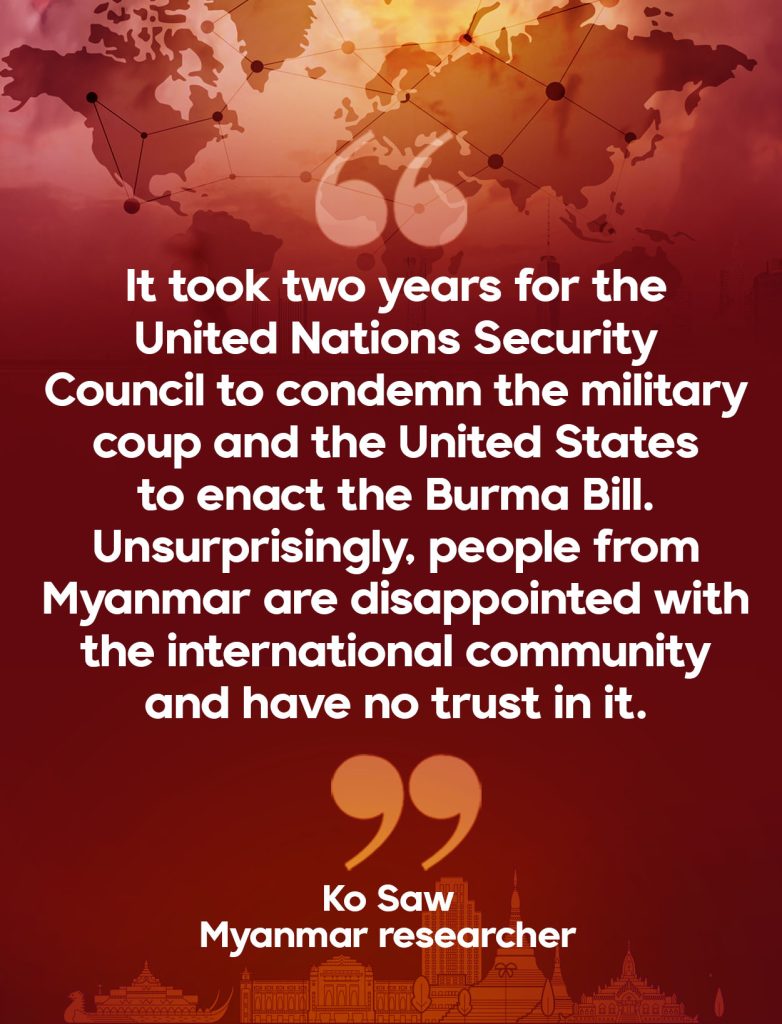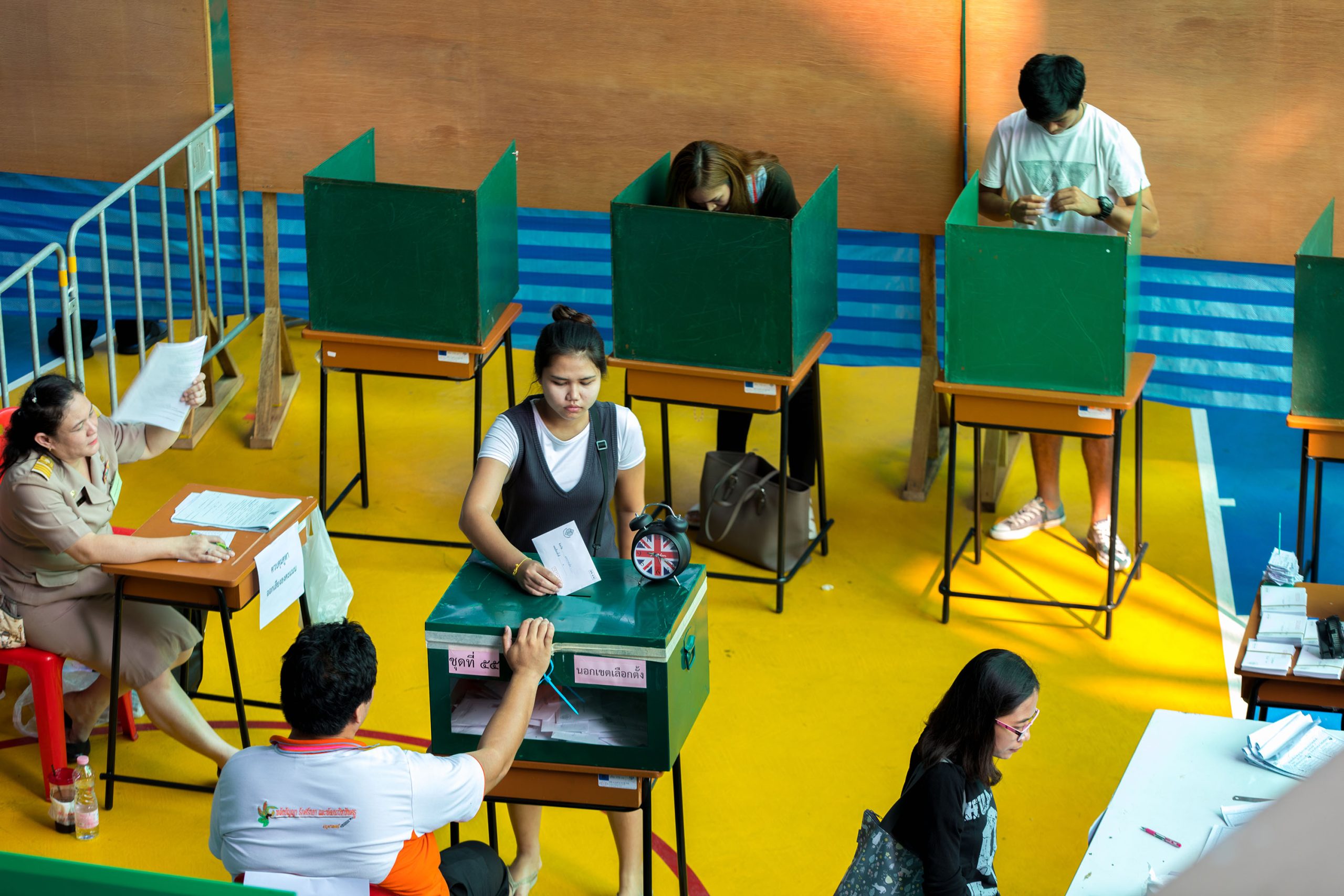|
Getting your Trinity Audio player ready...
|
B
etween the day of the coup on 1 February 2021 and 21September 2022 alone, Myanmar endured 2,414 days of fighting with 288 days of air strikes by the military junta. The Southeast Asian country’s own military, known as Tatmadaw, has killed more than 3,500 people since it seized power more than two years ago. More than 1.5 million people have been internally displaced, 39,000 properties have been burnt, and 17.6 million people need humanitarian assistance, according to the OCHA Myanmar’s humanitarian snapshot.

The people of Myanmar used to embrace non-violence and peaceful resistance, with the hopes of getting help from the international community. In the early months of the military coup, Myanmar’s people dedicated themselves to peaceful protests. But the junta replied with increasing brutality, making no exceptions even for women and children. And though the people of Myanmar let out cries for help, what they received from the rest of the world were mostly words of condemnation aimed at the junta.
This has pushed many of the country’s people to take the path of armed resistance and fight for the rights and freedoms that had been snatched away from them.
“The absence of [an] international community makes Myanmar people not trust the political solution and non-violent ways anymore,” says Ko Win, a Myanmar political process analyst working with many international organizations. “It pushed them to take arms. People, especially young people, have been angry and desperate because they started feeling that no one listens to their cries and no cares, and they are their own to defend and fight.”
“These people have no political interests,” he continues, “but they know what rights and justice are, and these are what they are fighting for.”
For his part, an exasperated young rights advocate from Myanmar says, “What we need is not the repeated words about how concerned and worried you are, but the actions to restore our democracy and rights and help us bring justice.”

Crumbling ‘consensus’
To be fair, several Western and democratic countries have imposed sanctions and restrictions on the military regime. Myanmar’s people also understand that coordinating steps such as a global arms embargo on the junta and targeted sanctions that would put a squeeze on its finances and revenue flow do take time. But actions related to these have not only taken long in coming, they have so far also been insufficient. And with Myanmar’s nearest neighbors and the junta’s strategic allies remaining silent over the regime’s crimes, it has been business as usual for the Tatmadaw. For the country’s people, that means enduring extended periods of martial law, deadly airstrikes, arbitrary arrests and detention, and rising lawlessness and violence.
Ko Saw, a Myanmar researcher at an international conflict monitoring organization, comments, “It took two years for the United Nations Security Council to condemn the military coup and the United States to enact the Burma Bill. Unsurprisingly, people from Myanmar are disappointed with the international community and have no trust in it.”
Western nations – and the United Nations – have in fact left much of the task of finding a solution to the problem that is Myanmar to the Association of Southeast Asian Nations (ASEAN). But the 10-member regional grouping’s ‘Five-Point Consensus,’ which it had crafted early on in the crisis and includes in its stipulations an immediate stop to the violence in Myanmar, has yet to work. The most ASEAN has managed to do to the junta is to bar Tatmadaw members from representing Myanmar in the grouping’s summits and related meetings. Malaysian Prime Minister Anwar Ibrahim himself has urged ASEAN not to stick to its principle of non-interference and to speak up against the junta’s continued atrocities.
Indonesia, which had called for an emergency ASEAN meeting right after the coup, is the grouping’s current chair. At the latest ASEAN summit in his country this May, Indonesian President Joko Widodo, admitted that “no significant progress has been made on the implementation” of the Consensus. He urged the formulation of “further steps,” but the Chairman’s statement at the close of the summit only reiterated that the Consensus would remain ASEAN’s “main reference,” while again calling “for immediate cessation of all forms of violence to create a conducive environment for the delivery of humanitarian assistance and inclusive national dialogues.”
Individually, some ASEAN member nations have been proactive in trying to find some means to stop the carnage in Myanmar. Last January, Indonesia established a special envoy office for the Myanmar issue. It is also said to be part – if not the initiator – of a series of supposedly secret meetings with representatives of the junta and those of fellow ASEAN member Thailand, as well as China and India. The last three are Myanmar’s immediate neighbors, and are seen by many as crucial in helping it find peace. Just like Myanmar, however, they all have autocratic regimes in place.
A club of their own
In a few weeks, a new prime minister may be heading Thailand, with Thai voters recently casting more ballots for opposition parties. But there is no guarantee that the conservative bloc of which current Prime Minister Prayut Chan-o-cha is a part will not remain in power, and that may not be good for the people of Myanmar.

The present Thai government led by former army general Prayut has refused to criticize the Myanmar military. In 2014, Prayut himself had headed a coup against an elected government. His regime has remained silent on the massive human rights violations committed by the Tatmadaw, even as hundreds of Myanmar people continue to pour into Thailand each month, seeking refuge. Official data show that some 22,400 people have crossed the border from Myanmar to Thailand since the Tatmadaw’s power grab in 2021, though the real figure can be higher. A conflict analyst based in Edinburgh says, “It makes total sense for an authoritarian country like Thailand to be silent over the atrocities and crimes committed by another neighboring authoritarian military dictatorship.”
Other analysts say that Thailand’s present leaders are concerned that any overt intervention in Myanmar could inspire Thai pro-democracy activists into action and launch a strong challenge to their regime. When Tatmadaw jetfighters violated the Thai sovereign airspace last July, Thai leaders did not issue a protest, and instead waited for an apology – which came — from Myanmar’s junta. Apparently, Thailand’s leaders still believe backdoor diplomacy remains the best option in dealing with the junta. They still think persuasiveness without corrective pressures – carrots without sticks – can work on the Myanmar military, although the growing presence of Myanmar refugees in Thailand continues to prove them wrong.
Thailand is among Myanmar’s top trade partners, as are India and China (which is number one). At the very least, Thailand is not known to be supplying arms to the junta, unlike India and China. According to education and research consultant Stan Jagger, the first ever UN Security Council statement on Myanmar avoided objections from China and Russia by leaving out any reference to an arms embargo. Just last 2 May, junta leader Min Aung Hlaing played host in Naypyidaw to Chinese Foreign Minister Qin Gang, who confirmed their two countries’ ties and firm “friendship.”
India’s northeastern state of Mizoram, meanwhile, has seen its more than 40,000 refugees from Myanmar’s Chin and Sagaing states settling there since the coup. India therefore would want to see a stable and peaceful Myanmar. In an article she wrote originally for The Diplomat, security expert Dr. Rajeswari Pillai Rajagopalan noted that after then Indian Foreign Secretary Harsh Vardhan Shringla’s visit to Myanmar in December 2021, India’s Ministry of External Affairs (MEA) had issued a statement saying that the official had expressed Delhi’s “interest in seeing Myanmar’s return to democracy at the earliest; release of detainees and prisoners; resolution of issues through dialogue; and complete cessation of all violence.”
But India now seems to be softening its stance toward Myanmar’s junta, largely because it wants to avoid China and Pakistan having greater influence on its next-door neighbor. Nearly a year after Shringla’s visit, successor Vinay Kwatra also took an official trip to Myanmar. Rajagopalan observed that the MEA press release after Kwatra’s visit “stated that he met with members of the military junta that is currently ruling the country and discussed security and stability in the border areas, human trafficking issues (several Indian nationals have been victims), and infrastructure development.” But, she pointed out, it “made no mention of any Indian interest in seeing Myanmar return to the path of democracy or the release of political prisoners and other tricky issues.”

Wrote Rajagopalan: “Pragmatism on account of the growing presence and inroads of China in Myanmar has possibly pushed India to give up on its moralizing about democracy and increase its outreach to Naypyidaw.”
An analyst based in Edinburgh says, however, “It is a shame that all the neighbors of Myanmar are being silent about the obvious crimes against humanity and even offer support to the perpetrators of these crimes.”◉



















